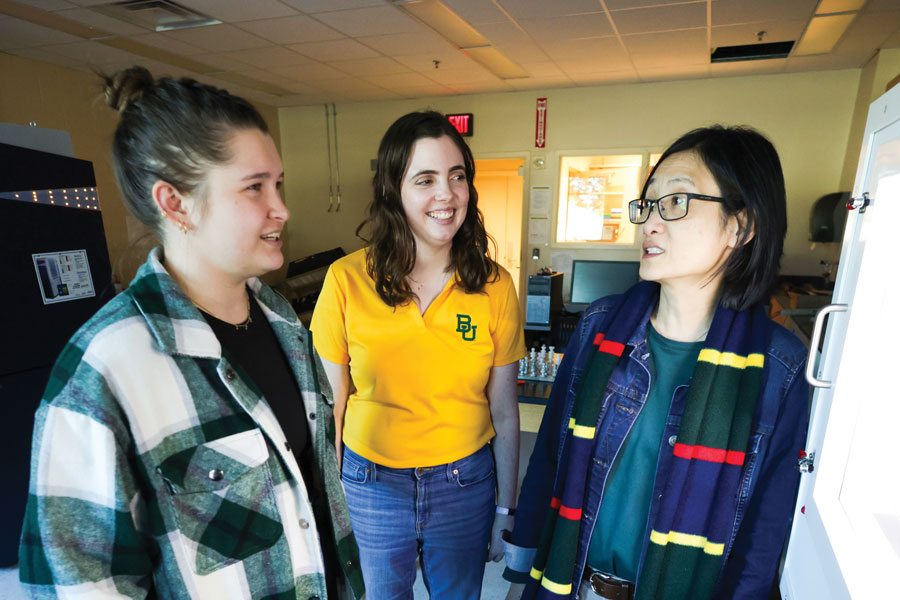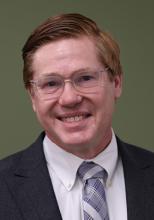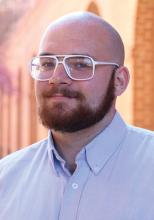Cascade of Learning
Mentorship in the Baylor Graduate School
Graduate students are choosing Baylor University in record numbers — this year’s enrollment shows 5,669 graduate students, constituting more than 27% of the Baylor student body. Those pursuing Ph.D.s come to Baylor at a unique time in their lives: a stage between full-time student and full-time professional, interacting with both professors and undergraduates to research, teach and grow. Further, their impact has been measurable: the University’s investment in graduate education played a meaningful role in the University’s R1 research attainment.
All of these factors place an important role on purposeful mentorship — long a staple at the intersection of Baylor’s academic excellence and caring community.
“It’s exciting to be a mentor as well as be mentored,” said Morgan Raines, a Ph.D. student working for Julia Chan, B.S. ’93, Ph.D., professor of chemistry. “Working with Dr. Chan feels more like a ladder than a hierarchy, and as we work with students as well, there’s a cascade of learning that takes place.”
What does that look like in the Graduate School? Baylor graduate students and their professors show how mentorship prepares them for leadership through personal relationships and scholarly productivity.
RELATIONSHIP and ACCESS
Kevin Dougherty, Ph.D.,
professor of sociology:
“I value the opportunity to train and shape a new generation of scholars, people that care deeply about the world and want a set of skills to make the world a better place. We’re committed to helping them flourish in every aspect of their professional lives, and their personal lives as well. That means being available and showing them how to be professionals in teaching, in service, in communicating, in community outreach — not just giving information but showing how to use those skills to serve others and break new intellectual ground.”
Michael Ryan, M.A. ’21,
Ph.D. student for Kevin Dougherty:
“One of the big reasons I selected Baylor was not only its academic reputation, but because it puts a heavy emphasis on us not just as researchers, but people. Dr. Dougherty engages with us formally and informally, and models how to engage with undergrads, other graduate students and with other professionals, as professionals.”
Melissa Anderson,
Ph.D. student for Julia Chan:
“Dr. Chan prioritizes her students. She’s an editor of a major journal (deputy editor for Science Advances), she’s doing important materials science research, but she always says her students come first. That means I have access to my principal investigator, and it’s incredibly helpful.”
PRODUCTIVITY and PRACTICE
Julia Chan, Ph.D.,
professor of chemistry:
“Our graduate students teach undergrads, work with students of all levels in the laboratory and are working on their own projects — project management is a huge part of a Ph.D. We have a very productive lab, and our students accomplish things that will help them launch their own academic careers: Morgan Raines just published a paper in the fall and Melissa Anderson is submitting one. It’s busy and stretches them, but it’s preparing them to be leaders. They are leaders now.”
Morgan Raines,
Ph.D. student for Julia Chan:
“Dr. Chan has us present to people who have no idea what our science is, and requires us to learn how to communicate the fundamentals to different groups. It could be a room full of organic chemists or a room full of donors. As a teacher, it gets us out of our comfort zone and forces us to explore new ways of explaining our work.”
Michael Ryan:
“Dr. Dougherty and I have co-authored two articles together and presented our research at conferences. On those papers, he helped me take a half-baked idea I had and see it through. He helped me with the finishing touches and seasoning, if we’re going with a cooking analogy. One thing about being a graduate student is that you know enough to get started. Dr. Dougherty points me to resources or relationships that help me build my own community as I pursue a more holistic intellectual framework. One thing I’ve learned from him and other professors in sociology: you need to be a self-starter to be successful, but at Baylor, you never walk alone.”
In the classroom, the laboratory, or in the quiet but intense hours working on projects or dissertations, Baylor graduate students are prepared to be academic professionals, responsible for teaching untold numbers of future students and advancing significant future research projects. They will soon advance the Baylor name and reputation as postdoctoral researchers or professors at other institutions, and the mentorship they receive from their own professors represents a distinct way to advance the Baylor Line — one that continues to grow in both scope and impact throughout the University.


